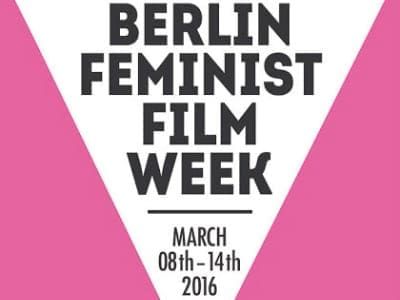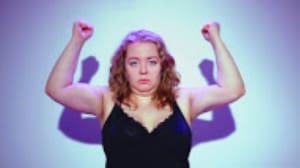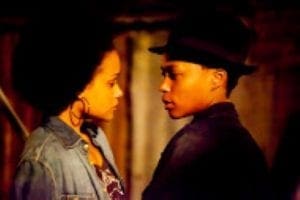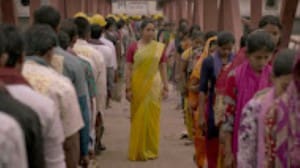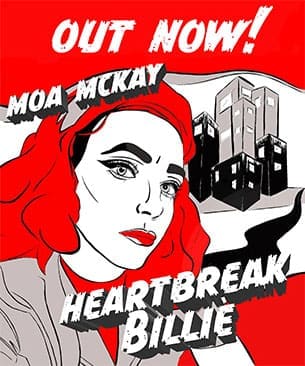Interview with the organizers of Berlin Feminist Film Week
Berlin Feminist Film Week turned three years old. Held every March since 2013, it opens up space on screen for perspectives other than your average white male that monopolizes mainstream cinema. But most importantly, it is a small but significant step closer to the inclusion of disruptive voices in the film industry and to the latter’s deconstruction from within. IndieBerlin was there and talked to founder Karin Fornander and co-organizer Lucía Martín.
indieberlin: How important is the female gaze behind the lens?
Karin Fornander: It’s extremely important. Feminism is about gender equality, and since the film industry is male-dominated, we are trying through our initiative to establish a platform for female filmmakers or people who don’t necessarily identify with the binary gender structure. We are also trans-inclusive, and have shown films by male directors from the queer space in the past. However, we don’t get submissions by male filmmakers often, and this year we didn’t decide on any of them. We also avoid choosing films that feature a cisgender male perspective, because these already dominate the industry.
“The majority of mainstream films are shot from a middle-class white male point of view. We need more intersectionality on screen”
indieberlin: But is the female perspective necessarily subversive? For example, Cynthia Mort’s upcoming film Nina has attracted a great deal of negative criticism for featuring Zoe Saldana as Nina Simone in “blackface”.
Karin Fornander: Just because a film may be directed by a woman does not automatically mean that it will be consistent with the feminist agenda. Nina is also an example of cultural appropriation, and that’s an issue we are concerned with as well. We try to choose films that reflect diverse cultural standpoints. For me, feminism is not just about women and men. It’s also about the incorporation of intersectional perspectives: different national backgrounds, races, classes. That’s crucial, as the majority of mainstream films are shot from a middle-class white male point of view. We need more intersectionality on screen.
indieberlin: Feminism has become more open to diverse genders, sexualities, and colors than ever. Then, why is it so often attacked, especially on social media?
Karin Fornander: I think that for a lot of people, feminism has a negative connotation. I personally cannot understand why. Feminism means equality for everyone. I don’t see why anyone would have a problem with that. For me, it’s important to identify as a feminist, because we have to recognize and pay tribute to all past generations of feminists that paved the way for us. If we detach ourselves from this concept, we are basically denying the necessity of their struggles.
“Feminism is not about “you”. It’s about acknowledging that there are structures that are damaging to others besides you”
indieberlin: That’s because many take gender equality for granted.
Karin Fornander: Exactly. I think it’s easy to do that if you happen to live in a country where women’s rights have been established through feminism. But feminism is not about “you”. It’s about acknowledging that there are structures that are damaging to others besides you.
Lucía Martín: We live in a patriarchal system. And for this system, feminism is a very dangerous concept. There’s a lot of propaganda going on that presents feminism as identical to female supremacist ideology. As a matter of fact, if you opened the previous edition of perhaps the most prestigious Spanish dictionary, the RAE dictionary (Real Academia de la lengua Española) to look up the term “feminism”, you’d find two definitions: the first one listed defined feminism as the idea that women should be on top of men. That’s so wrong. And the second entry was the one about gender equality. Keep in mind that this dictionary is updated every year. Thankfully, the first definition is now omitted from the updated edition. But still, this shows clearly that doing away with male entitlement is not appealing within a patriarchal social structure.
indieberlin: Feminism is often under attack because of its name, which, for some, has a totalitarian touch to it. We often hear, “If it’s about gender equality, why is it not called humanism?”
“The naming is a recognition of what the feminist movement has achieved since its emergence”
Karin Fornander: You can’t just change the word. There’s this great quote by American Indian comedian Aziz Ansari on precisely this matter: “You can’t be like, ‘Oh yeah I’m a doctor that primarily does diseases of the skin.’ Oh, so you’re a dermatologist? ‘Oh no, that’s way too aggressive of a word!” That’s basically how it is with feminism: it’s like saying “So you like gender equality?” “Yes,” “So you’re a feminist?” “No, I would never call myself that, that’s too aggressive!” The naming is a recognition of what the feminist movement has achieved since its emergence, and questions like ‘So, are you the kind of feminist that hates men, or are you the kind of feminist that wants equality?’ are simply wrong.
Lucía Martín: I think many women in the West don’t realize that they are still underprivileged compared to men. And at the same time, when women are given space in the media, whether that’s in films, videos, or campaigns, you get commentaries all the time, mainly by men, saying ‘What about the men?’ But men are already visible. They are not in our shoes. We grow up being attacked in many different ways.
“We don’t want to be a separatist space exclusively for people who are already in the movement”
Karin Fornander: I think an important point is that, even if a woman hates men, the worst thing that can happen is that she might make fun of them on social media, the Internet, whatever. Whereas, if it’s the other way round, there are often cases where the level of hatred on behalf of men can get women killed.
indieberlin: You say on your website “We welcome every film fan, cinema-goer, feminist and non-feminist to enjoy the Berlin Feminist Film Week.” How do you define a “non-feminist”?
Karin Fornander:: There are many people who are unaware of what it really means to be feminist. We actually got an email from one of the viewers saying that attending the event changed her perception of feminism and eliminated any negative connotations it used to have. That’s the good thing with film: it’s an easy and accessible medium, and even if you are not familiar with feminism, you can still come, watch the films, listen to the discussions, and perhaps realize “Wow, maybe I’d missed the point of feminism all along.” We don’t want to be a separatist space exclusively for people who are already in the movement. We are trying to be open, and maybe get some more people on board!
indieberlin: Which were your favorite films from this year?
Lucía Martín: You can’t really choose one! However, the short film program “BODY POSITIVE – My body is my temple” was particularly interesting, because it underscored the objectification of female bodies that often goes unnoticed. Fat-shaming is a regular punishment for women who exceed the socially-imposed body standards, and the screening of the films in this program, along with the panel discussion that followed afterwards helped to foreground the fat acceptance movement for the audience.
“You cannot exhaust the aspects of feminism in one week, so every year we have a different focus”
Karin Fornander: I’m very happy that we got a very well-rounded program with diverse topics. You cannot exhaust the aspects of feminism in one week, so every year we have a different focus. Basically, the whole festival is a long-term work in progress. I do think though that the film Under Construction by Bangladeshi filmmaker and outspoken feminist Rubbaiyat Hossain stood out this year due to its intersectional perspective: a film from Bangladesh, by a female filmmaker, and, instead of focusing on topics like poverty or Islamic radicalism that one would expect a Bangladeshi film to portray, it depicts a middle-class female perspective. And this makes the film relatable on a human level, as it shows that we are not so different after all.
By Evdokia Prassa
Evdokia Prassa is a Berlin-based freelance writer. You can contact her at evdokia.prassa at posteo.net

